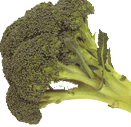Live Well, Eat Whole
An introduction to whole foods and nutrition by Jan Ridgely

Calcium
While not a category of food, calcium may as well be as it gets an awful lot of attention these days and is a vital component of women's health. Calcium is not the only nutrient required for bone health! Supplement companies and the dairy industry would have you believe otherwise.
In industrialized countries, calcium recommendations are so high because we eat too much protein and refined products, which draw calcium from bone. At a recommended level of 1200 mg per day, the US estimates are nearly three times The World Health Organization estimate for calcium at 450 mg per day.
Calcium does some good things:
-Decreases osteoporosis risk
-Decreases colorectal cancer risk
-Decreases hypertension - or high blood pressureExcess calcium can increase risk of kidney and gallstones, decrease absorption of magnesium, and actually block bone formation -the very reason most of us take calcium supplements to begin with!
What to do:
1. Reduce intake of calcium drainers: -Coffee, alcohol, sugar and refined flour
2. Increase calcium enrichers -Dark greens, bones (make soups), nuts, seeds, dry beans and peas, bok choy, broccoli, celery, mustard greens, essential fats, seaweed
3. Monitor protein intake-need enough but not too much!
4. If lowering cholesterol, increase calcium from non-dairy sources - diets can be one of the biggest drainers of calcium - especially popular protein only diets and dairy eliminating (without adding non Ca sources).
5. Supplement with caution-don't take calcium alone - over 15 nutrients required for our bones-all found in whole foods!
Don't take calcium in antacids!
-Take in the evening
-Take with vitamin D
-Increase fruits and vegetables to decrease blood acidity
-Sufficient protein intake from non-animal sources
-Increase movement of any kind
© Jan Ridgely, MS Nutrition and Peak of Health 2002